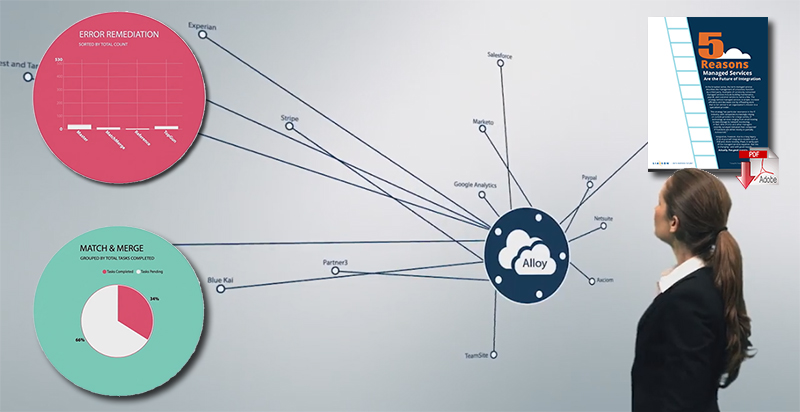5 Reasons Managed Services are Key to your Integration Strategy

Earlier this year, Liaison introduced its brand new cloud integration platform ALLOY™ and, along with it, a brand new as a Service category called dPaaS (Data Platform as a Service).
The dPaaS category, defined as a multi-tenant cloud platform that provides unified and tailored integration and data management solutions, was born out of necessity as no integration solution category existed that adequately conveyed the unique properties of the Liaison ALLOY Platform.
If it wouldn’t have been too much of a departure from the as a Service naming convention we’ve all grown accustomed to, we could have categorized our unique new offering as dPaaMS to call attention to one of the most important tenets of dPaaS: integration delivered as managed services.
So what is integration as managed services exactly?
It’s an integration approach in which the integration solution provider assumes all the integration related functions between systems, businesses, and applications on behalf of an enterprise. Functions that, in and of themselves, provide no strategic business value, yet require considerable IT overhead to develop and maintain. The integration provider’s platform then becomes the central hub that connects on-premises applications, cloud solutions, external trading partners, or all of the above.
And why is a managed services approach key to your integration strategy? Next are five really good reasons.
Managed Services are the Future of Integration

Whitepaper Download: 5 Reasons Managed Services are the Future of Integration
In the broadest sense, the term managed services describes the management of a business function by a third party. Examples of commonly consumed managed services include building maintenance, payroll, and customer service to name a few. The strategy behind managed services is simple: increase efficiency and decrease cost by offloading work that is not central to an organization’s mission to a specialized provider.
Reason #1: You’ve got better things to do
Running an in-house integration platform is a lot of effort. By partnering with a managed services provider that can take over the ‘plumbing’ (integration), enterprises are afforded the breathing room to move internal IT staff onto more strategic projects that drive revenue and serve the business’ core mission.
Reason #2: Your very own Center of Excellence
When integrations are built inconsistently, a single department or line of business at a time, there is a high cost to be paid in terms of inefficiency and fragmentation of enterprise-wide issues such as data security, compliance, and governance. A Center of Excellence combats these issues by pooling people, processes, and tools for economies of scale. Integration expertise is no longer trapped in functional silos and integration building blocks can be cataloged and reused. And guess what? Managed services providers, by their very natures, are Centers of Excellence.
Reason #3: Keeping up with the Joneses
By leveraging the infrastructure of the integration provider, whose core focus (unlike yours) is to evolve the integration platform, enterprises have access to the most current and cutting-edge technologies—from microservices to tokenization to tomorrow’s genius new breakthrough—without having to invest time and money into implementing these technologies.
Reason #4: Predictable, lower, OPEX costs
Enterprises often invest large amounts of capital on big IT undertakings only to discover that once the project is complete, many months to years later, the technology is obsolete or requires a major upgrade. In these cases, neither success nor cost is predictable. A managed services approach neutralizes these uncertainties through its fixed cost structure and proven ability to efficiently implement the solution required. What’s more, its economies of scale are able to provide the solution at far lower costs than individual enterprises would invest otherwise. As an added bonus, CAPEX dollars turn into OPEX dollars under the subscription pricing model of managed services, freeing up capital for other growth initiatives.
Reason #5: Today’s data landscape demands it
Integration, due to a long legacy of do-it-yourself solution models such as ESB and, more recently, iPaaS, is rarely offered as managed services. But the landscape is changing. Do-it-yourself integration may have been feasible when slow-moving ERPs and their tightly-coupled modules dominated the enterprise application landscape, but today, as highly specialized applications rapidly replace the functionality of ERPs, it’s becoming too difficult for internal IT organizations to keep up. The sheer number of diverse applications at play—and the speed at which they become players—put timely do-it-yourself integration development and maintenance out of reach for all but those who devote millions to the task.
Article Topics
Liaison Technologies News & Resources
3 Reasons You Need an Integration Center of Excellence and 3 Reasons You Shouldn’t Build It Yourself 3 Use Cases for Cloud Integration Platforms What do the Presidential Elections have to do With Your Integration Strategy? The Game Changers of Integration 5 Reasons Managed Services are the Future of Integration 5 Reasons Managed Services are Key to your Integration Strategy Beyond Traditional Electronic Data Interchange, EDI More Liaison TechnologiesLatest in Technology
Spotlight Startup: Cart.com Walmart and Swisslog Expand Partnership with New Texas Facility Taking Stock of Today’s Robotics Market and What the Future Holds Biden Gives Samsung $6.4 Billion For Texas Semiconductor Plants Apple Overtaken as World’s Largest Phone Seller Walmart Unleashes Autonomous Lift Trucks at Four High-Tech DCs Talking Supply Chain: Procurement and the AI revolution More Technology













